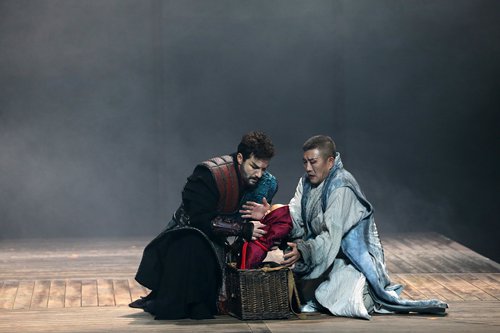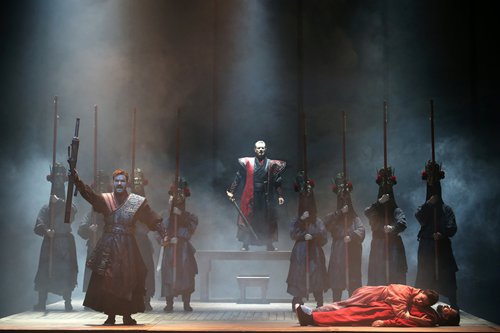LIFE / MISCELLANY
First-ever Chinese-Greek stage play wows audiences in Athens with adapted version of classic revenge story

The Orphan of Zhao debuts at the National Theatre of Greece in Athens on Sunday. Photo: Courtesy of Wang Xiaoying

The Orphan of Zhao debuts at the National Theatre of Greece in Athens on Sunday. Photo: Courtesy of Wang Xiaoying
After the premiere of his stage play The Orphan of Zhao at the National Theatre of Greece in Athens on Sunday, director Wang Xiaoying posted some photos of the show on WeChat along with a message that said that the Greek audience was "shocked" by the show.
"For me, being here [in Greece] means pursuing the exchange and collision of the two cultures," the veteran director, who spent two years working on the collaboration between Chinese and Greek troupes and two months rehearsing in Athens, told the Global Times.
Back in 2016, after several successful international collaborations with Western troupes, Wang decided he wanted to take things a bit further. He eventually teamed up with the National Theatre of Greece on a bold new project - a bilingual play in which Chinese and Greek actors speak their lines in their native tongue.
A bridge, not a barrier
"It was an unheard-of challenge for both us," Wang confessed, noting that rehearsals were extremely difficult for the cast made up of two Chinese and 13 Greek performers.
"After months of hard work, they were able to work together very well. Sometimes they give the impression that they can actually understand what each other are saying. It is definitely a special experience for audiences."
Audiences needn't fear that they will be lost if they don't speak both languages as bilingual subtitles are shown on screens near the stage.
The classic Chinese play The Orphan of Zhao was first introduced to Europe in 1731. The story follows a physician, Cheng Ying, as he tries to protect the last remaining member of the Zhao family from Tu'an Gu, the general that had all 300 members of the Zhao clan slaughtered. Sacrificing his own child to ensure the safety of the "Orphan Zhao," Cheng Ying raises the boy to maturity and helps him plan his revenge against the general.
"Revenge has played a very important part in all the world's dramas. Ancient Greek dramas have revenge stories, like the one about Agamemnon," said Wang.
"The idea of an eye for an eye is often questioned by modern minds. Through this play, I not only depict the traditional Chinese ethics on display in the original story such as loyalty, commitment and self-sacrifice, but also reexamine the concept of revenge by weighing it against the ideas of mercy and kindness in Chinese philosophy."
Greek tragedies are a familiar genre to audiences in Greece. In Wang's opinion, the commonalities in The Orphan of Zhao and ancient Greek plays helps narrow the culture gap between the two cultures. To close that gap even further, Wang and his writing partner Yu Qingfeng changed the happy ending in his Yue Opera version of the play in which the orphan decides to forgo revenge to one that was even more tragic. In this new version, Cheng Wu, the orphan, decides to follow through with his plans for revenge. Although he was saved as a baby by the kind Cheng Ying, but in the end he becomes a cold-blooded killer, a monster.
"This tragic ending is a better depiction of the Chinese philosophical idea that being good or evil comes down to a fleeting moment of choice."
Shared values
Wang's creative directing style has earned him quite the reputation on the world's stage. In 2012, he adapted Shakespeare's Richard III into a Chinese period piece full of Chinese elements such as traditional Chinese roles, acrobatics and martial arts. The play debuted at the London Globe during the 2012 Globe to Globe Festival, winning applause from picky London audiences. Four years later, he stunned Australian audiences with his interpretation of German playwright Bertolt Brecht's The Caucasian Chalk Circle.
"I am a Chinese director who has systemically studied Western plays," Wang, the first person in China to earn a doctorate in stage plays, said.
"My style has always been a combination of China and the West. For this play, Chinese actors need to maintain their own characteristics while their Greek counterparts also keep their Greek style."
Before the play, the Greek actors knew little about Chinese culture or Chinese plays. After the rehearsals, however, they quickly became eager to learn all they could.
"They showed interest and admiration for traditional Chinese dramas and the core theories that are at the heart of Chinese philosophy. Some of them started studying Chinese dramas during spare time and some even began to learn Chinese. They also learned about Chinese virtues: being loyal to commitments and being kind. I think this is truly the only way Chinese culture can make its way abroad," he said.
The play will run until December 2 at the National Theatre in Athens.

